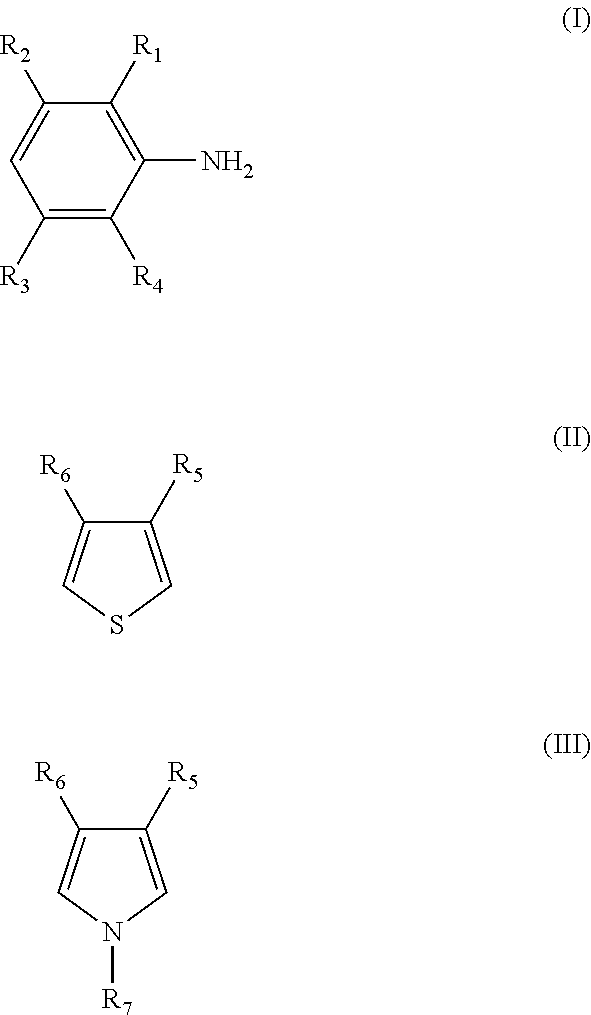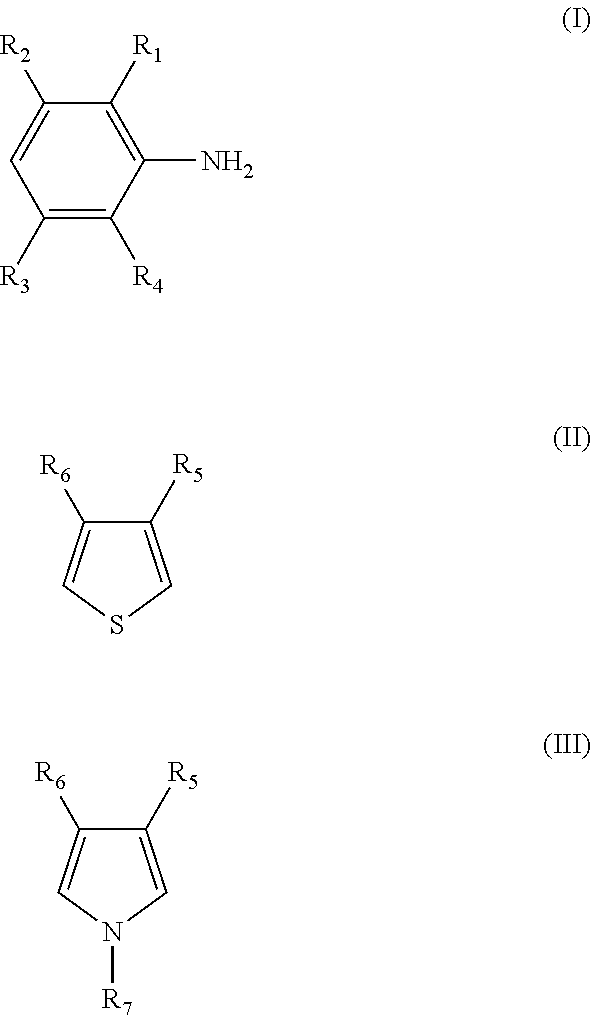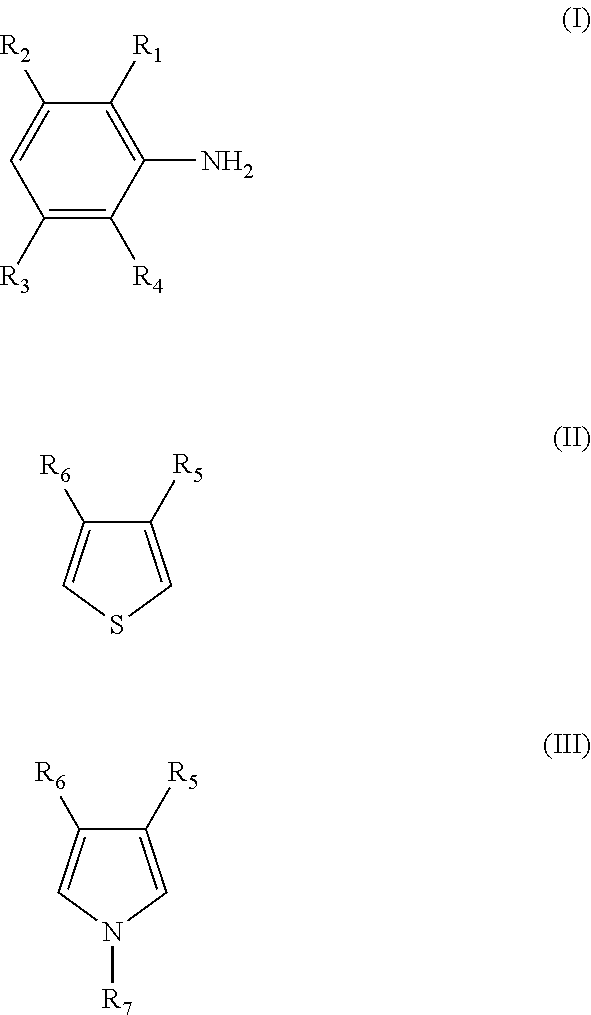Composite conductive polymer composition, method of manufacturing the same, solution containing the composition, use of the composition
- Summary
- Abstract
- Description
- Claims
- Application Information
AI Technical Summary
Benefits of technology
Problems solved by technology
Method used
Image
Examples
synthesis example 1
Polymerization of Polymer Compound
[0130]Styrenesulfonic acid (NaSS) (25 g), 2-hydroxyethyl methacrylate (2-HEMA) (20 g), phenoxyethyl methacrylate (PEMA) (55 g), ion-exchange water (100 g), isopropyl alcohol (IPA) (100 g), methyl ethyl ketone (MEK) (150 g) were added to a four-neck flask with a volume of 1000 cm3 and having a stirrer, a nitrogen gas introducing tube, a reflux condenser, an inlet and a thermometer. While introducing nitrogen gas into the flask, and the mixture in the flask was heated to 70 deg. C. Thereafter, azobisisobutyronitrile (0.3 g) was added to the flask, and the polymerization reaction was conducted for 18 hours at 70 deg. C. to obtain a polymer solution (A-1).
synthesis example 2
Polymerization of Polymer Compound
[0131]The polymer solutions (A-2 to 14) were obtained by the method of the polymerization of the polymer compound as in Synthesis Example 1 except that the monomer and the polymerization solvent were changed as shown in Table 1. The polymer solution (A-1) obtained in Synthesis Example 1 is also shown in Table 1.
TABLE 1PolymerizationPolymerMonomer CompositionMedium CompositionSolutionNass2-HEMA2-EHMAPEMAFA-513MWaterIPA MEKA-12520 (25)—55—100100150(20)(55)A-22851 (60)—21—100200—(20)(20)A-32633 (40)—41—100100150(20)(40)A-46414 (20)—18—150200—(60)(20)A-54215 (20)—43—100100150(35)(45)A-64436 (45)—20—150200—(35)(20)A-72520 (26)29 (25)26—100100150(21)(28)A-82422 (31)30 (28)—24 (20)100150150(21)A-91921 (26)—60—100100150(15)(59)A-107714 (20)— 9—100200—(70)(10)A-1157 7 (10)—36—100150150(50)(40)A-122861 (70)—11—100200—(20)(10)A-131316 (20)—71—100150150(10)(70)A-141912 (15)—69—100150150(15)(70)
[0132]In Table 1, Nass represents styrenesulfonic acid, 2-HEMA repre...
synthesis example 3
Purification of Polymer Compound
[0133]The polymer compound powder AP-1 to 14 were obtained by one of the methods shown below from the polymer solution A-1 to 14 obtained in Synthesis Examples 1 and 2. The weight-average molecular weight (Mw) of the obtained powder measured by the gel permeation chromatography (GPC) is shown in Table 2.
[0134][Purification Method A]
[0135]The total amount of the obtained polymer solution was moved to a 2000 cm3 beaker, and acetone (600 g) was added thereto while stirring by a stirrer, and thereafter the stirring was stopped to obtain a precipitate. The precipitate was subjected to filtration under reduced pressure, and the residue was dried for 24 hours at 100 deg. C. by use of a dryer, followed by pulverization by use of a mortar, to obtain powder of the polymer compound.
[0136][Purification Method B]
[0137]The total amount of the obtained polymer solution was moved to a 2000 cm3 beaker, and IPA (600 g) was added thereto while stirring by a stirrer, and...
PUM
| Property | Measurement | Unit |
|---|---|---|
| Percent by mass | aaaaa | aaaaa |
| Substance count | aaaaa | aaaaa |
| Electrical resistance | aaaaa | aaaaa |
Abstract
Description
Claims
Application Information
 Login to View More
Login to View More - R&D
- Intellectual Property
- Life Sciences
- Materials
- Tech Scout
- Unparalleled Data Quality
- Higher Quality Content
- 60% Fewer Hallucinations
Browse by: Latest US Patents, China's latest patents, Technical Efficacy Thesaurus, Application Domain, Technology Topic, Popular Technical Reports.
© 2025 PatSnap. All rights reserved.Legal|Privacy policy|Modern Slavery Act Transparency Statement|Sitemap|About US| Contact US: help@patsnap.com



